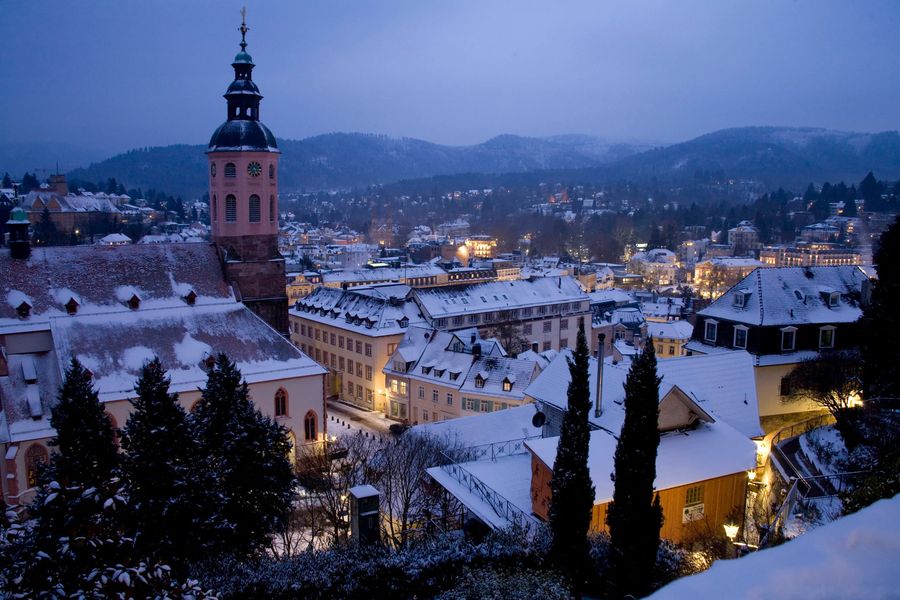
Baden-Baden
Nestled at the foothills of the Black Forest in southwest Germany, Baden-Baden is a charming spa town that has been synonymous with relaxation, luxury, and culture for centuries. Famous for its thermal springs, elegant architecture, and stunning natural beauty, Baden-Baden is the perfect destination for those looking to unwind in a serene and sophisticated setting. With its rich history as a retreat for European aristocracy and its modern-day appeal as a hub for wellness, culture, and outdoor activities, Baden-Baden offers a unique blend of tradition and modern luxury.
A Historical Gem
Baden-Baden’s history as a spa destination dates back to Roman times, when the Roman Empire recognized the healing properties of its thermal springs and established baths here around 70 AD. The town’s name, “Baden,” meaning “to bathe,” reflects its longstanding association with wellness. During the 19th century, Baden-Baden became the summer capital of Europe, attracting royalty, nobility, and the wealthy elite from across the continent. Figures such as Queen Victoria, Napoleon III, and Russian Tsars were frequent visitors, solidifying its reputation as a glamorous retreat.
Today, Baden-Baden has maintained its status as a premier spa destination, offering visitors the opportunity to indulge in luxurious wellness treatments while exploring its rich cultural and historical landmarks.
Top 5 Unique Characteristics of Baden-Baden
1. Thermal Baths and Spa Culture
Baden-Baden’s thermal baths are the city’s defining feature, with the legendary Caracalla Spa and the historic Friedrichsbad offering world-class wellness experiences. The Caracalla Spa is a modern spa complex with indoor and outdoor thermal pools, whirlpools, and saunas set against the stunning backdrop of the Black Forest. The Friedrichsbad, on the other hand, is a Roman-Irish bathhouse built in the 19th century that combines ancient Roman bathing traditions with Irish hot-air baths. Visitors can immerse themselves in the naturally warm, mineral-rich waters that have drawn people to Baden-Baden for centuries, experiencing a blend of relaxation and history.
2. The Kurhaus and Casino
The Kurhaus is the heart of Baden-Baden’s cultural and social life. This grand 19th-century building houses the Baden-Baden Casino, one of the most beautiful and prestigious casinos in the world. Renowned for its opulent interior, the casino is often compared to the palaces of Versailles and has been a favorite haunt of aristocrats, writers, and artists, including Marlene Dietrich and Fyodor Dostoevsky. The Kurhaus also hosts concerts, balls, and events, adding to the town’s reputation as a center for high society and entertainment.
3. Festspielhaus Baden-Baden
The Festspielhaus is one of Europe’s largest opera and concert halls, attracting some of the world’s most renowned musicians and performers. Built in a former railway station, the Festspielhaus combines history with modernity, offering an exceptional venue for classical music, ballet, and opera. The annual Easter Festival, organized in collaboration with the Berlin Philharmonic Orchestra, is a highlight of the cultural calendar, making Baden-Baden a premier destination for art and music lovers.
4. The Black Forest and Nature
Baden-Baden is ideally situated at the edge of the Black Forest, one of Germany’s most picturesque regions. Visitors can explore miles of hiking trails, take scenic drives, or enjoy outdoor activities such as cycling and golf. The Merkur Mountain offers panoramic views of the surrounding countryside, and visitors can take a funicular railway to the top for stunning vistas. Whether you’re looking to enjoy nature or relax in the fresh air, the Black Forest adds a sense of tranquility to the Baden-Baden experience.
5. Roman Ruins and Historical Heritage
Baden-Baden’s long history is reflected in its Roman heritage, with the Roman Bath Ruins offering a glimpse into the town’s ancient past. These ruins, dating back over 2,000 years, were once part of the Roman bathing complex that established Baden-Baden as a spa destination. Visitors can tour the ruins and learn about the history of Roman bathing culture, adding a historical layer to their wellness experience. The town’s beautifully preserved Belle Époque architecture, including elegant villas and grand hotels, further highlights its historical charm.
Baden-Baden Today: A Modern Spa and Cultural Destination
Today, Baden-Baden is not only a world-class spa town but also a cultural and recreational hub. The city is home to numerous galleries, museums, and parks, such as the Lichtentaler Allee, a beautiful tree-lined promenade that stretches along the Oos River. The Museum Frieder Burda, with its impressive collection of modern and contemporary art, adds to the town’s cultural appeal.
Baden-Baden also hosts various events throughout the year, including horse races at the Iffezheim Racecourse, food and wine festivals, and Christmas markets. Its blend of historical significance, wellness offerings, and modern luxuries make it a destination that attracts visitors from around the world.
Fun Facts About Baden-Baden
Baden-Baden’s name means “Bathing-Bath,” emphasizing its role as a spa town since Roman times.
The Baden-Baden Casino was described by Marlene Dietrich as “the most beautiful casino in the world.”
The town’s thermal springs pump out 800,000 liters of water a day, at temperatures ranging from 50°C to 68°C (122°F to 154°F).
Dostoevsky famously lost much of his fortune gambling at the Baden-Baden Casino, which inspired parts of his novel “The Gambler.”
The Friedrichsbad offers a 17-step bathing ritual that combines Roman and Irish bathing traditions.
With its perfect combination of luxury, history, and natural beauty, Baden-Baden is a place where relaxation and culture come together to offer an unforgettable experience. Whether you’re soaking in its famous thermal waters, exploring its grand casinos, or enjoying the serenity of the Black Forest, Baden-Baden is a destination that promises to rejuvenate both body and soul.